If you often feel anxious and embarrassed, this guide is for you. It will give you the tools you need to be more relaxed in social settings, get out of your head and into the conversation.
This guide is for anyone who’s feeling overly self-aware, but examples are geared toward adults in work or at college.
Note: Sometimes, the underlying reason for self-consciousness is social anxiety. If this is the case for you, here’s our list of the best books on social anxiety.
Let’s get started!
1. Focus on someone or something
Self-consciousness comes from being overly concerned with how people see us. We worry that we won’t be seen as smart, attractive, or that others are judging us.
It can be exhausting, and with too little evidence to support the argument in either direction, we go straight to the most negative conclusion.
To get out of this pessimistic mindset, try shifting your attention to the people around you and your environment.
Focus not on what others think of you but on learning about the people you’re with. Make it a point to find out one thing about every person you meet. It could be their job, their major, or what they did on the weekend.
The objective is to get out of your head. Put that energy into the people around you rather than into feeding an inner dialogue that’s holding you back.
2. Question your inner critical voice
It’s easy to believe the negative voice inside our head is always right. But have you tried questioning it? You might find out that it has little to do with what’s real.
Check the evidence from your life:
Can you recall a time you did something that proves your inner critic wrong? For example, if your voice says, “I always mess up around people,” remind yourself of a time when you did just fine.
Ask yourself if what you are feeling is reasonable. Or, are you letting a perception you think others have of you, run the story in your head?
3. Know that people notice you less than you think
In an experiment, students were asked to wear an embarrassing t-shirt.
By the end of the day, the students who wore the shirts estimated that 46% of the class had noticed. When polled, only 23% of their mates actually had.[1] In other words, their embarrassing t-shirt was only half as noticeable as they had thought.
What feels mortifying to us is usually having little to no impact on others. People are caught up in their own thoughts and struggles, too busy to worry about ours. The best thing we can do is remind ourselves that no one cares as much as we do, and even our own filter is not a perfect lens.
4. Know that it’s OK to say some stupid things
I remember talking to a girl I was crushing on when I was in high school. She was talking about how her brother liked a band, and like a crazy person, I said, “Ya, I know.” Like somehow, I knew what group her brother liked. My crush looked at me strangely but kept going.
Did it make any difference to my crush? Not really. At this point, I can laugh about it, but at the time it felt humiliating.
Try turning the tables on the situation. Would you care if someone blurted out something silly? Or would it just pass you by without giving it extra thought? It’s better to talk freely even if you say something stupid every once in a while. The alternative is to always guard yourself, and that can make you come off as stiff and aloof.
5. Don’t try to fight your feelings
Emotions tend to cling harder when we fight them and weaken when we accept them.[2]
When you are anxious, and feeling uncomfortable in a social setting, what are you thinking about? How does thinking about that make you feel? Happy, sad, nervous, jealous? What’s your body doing when you’re in your head and feeling awkward at a party? Are you sweating, jumpy, yawning a lot (a reaction to nerves)?
Simply accept how you feel rather than trying to change it.
Now focus outward. Talk to someone. Ask them how they’re doing. What brings them to this party/event? Do they know anyone? Then check your head. How do you feel when you’re talking to someone? Do you get any less nervous as the conversation goes on? If you were blushing, has it subsided yet?
Practice going back and forth between your inner thoughts and how you feel when you are talking to others. See if you feel better when you’re in your head, listening to your internal dialogue, or when you’re spending your energy on others.
6. Focus on your positive traits
This isn’t “think happy thoughts, and you’ll be fine.” Instead, you want to base your self-worth on your real, positive qualities rather than cynical and questionable self-talk. This is what we know is true:
- You have talents and abilities that give you fundamental value.
- This combination of characteristics makes you unique and memorable.
- You are worth spending time with and knowing.
Try to list your concrete skills like your mathematical ability, you’re a good writer, you’re multilingual, you’re a great cook. Then there are your personality traits. You’re kind, honest, genuine, funny, enthusiastic, etc.
Even if you can’t make a full list today, write one positive quality down every day and then review the list every week. When you have a comprehensive list, read it every day. You’re training your mind to focus on what you do well and to be able to access it quickly.
7. Make sure you’re reading the situation right
Negative experiences can teach us to be on guard and defend ourselves from criticism and hurt. This can affect how we perceive the world and the people we encounter.
Those of us who are overly self-conscious might believe the world will judge us harshly because that is what we’ve experienced. However, as I’ve pointed out, people don’t care that much about how we act or what we say. Every new person you meet thinks of you as a blank slate.
When you’re in a scary social situation, ask yourself, “Is there a chance my past experience is affecting how I’m seeing this interaction? Is there another, more realistic way I can approach his conversation?”
Believe people will be friendly, and most of the time, they will be. If not, it says more about them than you.
8. See yourself as a social observer
People watching is fascinating, and it shows us how our basic humanity makes us all messy, foolish, and funny. Go to the mall, grab a coffee/tea, and watch people walk with their friends. Listen in as they sit beside you and talk, or as they chase their kids down the hall.
Now notice their body language, their tone of voice, and eavesdrop on what they’re saying. What we’re doing is training you to switch your focus from yourself to others and to think objectively about what you’re witnessing.
Are people relaxed or stilted? Is their posture good, or are they slouching? When they talk, are they quiet, or does the volume go up and down with excitement? The more we see others being their imperfect selves, the more we’ll realize this is what ‘normal’ looks like.
Go into this observer mode when you walk into a room of strangers. It can help you be less self-conscious.
9. Assume that people will like you
This one is about the mechanics of being seen as confident rather than inhibited or self-conscious. When we feel uncomfortable, it can make us talk softer, hug our bodies with our arms, and speak faster to get the words out and move the focus off us as soon as possible. It can make us seem aloof, and even if we don’t intend to, it makes us less approachable.
Be confident and friendly right off the bat. Walk up to people with a warm smile and present yourself. If you’re uncertain about the details, look at how likable, confident people do it and learn from them. Assuming people will like you is a self-fulfilling prophecy. Assuming they won’t is, too.
10. Ask about others to take the focus off you
It’s easier to focus on someone else other than ourselves. When you meet someone for the first time, ask them what they do for fun. What are their hobbies, or do they have any pets? Listen carefully, nod, and give them signs that you are enjoying their story. Then add anything relevant that applies from your life. Things like your pets – what kind are they, their name, breed…or your hobbies. At the end of the day, you want to have a balance between learning about them and sharing about yourself.
The goal is to learn about someone else because it’s hard to be self-conscious when you’re focused on getting to know another’s interests and stories.
11. Make internal progress checks, not comparisons
Jealousy is a miserable emotion. It makes you feel small and worthless and sucks the joy out of everything. It’s like anger directed at someone else, but you are the one who feels crappy.
Avoid both overexaggerating someone else’s talents or trying to find flaws in them to make yourself feel better. No one is perfect, and tearing them down when you feel envious just retains the focus on you because you are still comparing yourself to someone else.
Here’s a thought: What if we were OK with the fact that someone is more accomplished than us? When we accept this, it helps us see ourselves differently.
Our value then has nothing to do with how successful we are or how good we are at something. We want to go from “I like myself because I’m good at…” to “I like myself.” (Period.) This makes our self-acceptance unconditional.
How do we accept that others are more accomplished than us and be OK with that? First, let that fact sink in, and allow all your emotions of envy and sadness to come to you. Accept those emotions rather than fight them. Now, you no longer need to fear them. Afterward, you will be less prone to comparisons.
Here’s another way to do it:
Instead of thinking, “Well, at least I’m better than them when it comes to X.” Say, “I’m not good at everything, which is OK because my value isn’t based on my achievements. I have value because I am 100% myself”.
Let’s talk more about how to be more self-accepting…
12. Practice accepting yourself
Self-acceptance is one of the biggest steps we take towards achieving self-confidence.
According to Aaron Karmin, MA, LCPC, a psychotherapist in Chicago, Ill, a person “who accepts [themselves] unconditionally as a worthwhile human in spite of [their] faults and imperfections does not experience the stress of self-consciousness.”.[3]
Here are some things you can do to accept yourself:
- Decide how you are going to live your life. Will you let others define your personal image, your strengths, and your weaknesses? Try to move from blame, doubt, and shame to tolerance, acceptance, and trust.
- Make a list of all your good points.
- What do you do well?
- What are you proud of accomplishing?
- Whose lives have you made better?
- Connections you’ve made with others.
- Hardships you have overcome.
Review the list often, so you see your progress and acknowledge your gifts.
- Take an inventory of the people close to you.
- Are they good for you?
- Do they reinforce negative self-talk?
- Do they criticize or demean you?
Consider eliminating all the negative influences in your life.
- Surround yourself with a positive support group of people who celebrate you.
- Forgive yourself. If you made a mistake, realize you did your best with the information you had at the time, or you simply made a bad choice. But now you chose to move on and forgive yourself.
- Silence your inner critic. Just because it’s hard to hear doesn’t mean it’s right or 100% true. If you wouldn’t talk to someone else like you speak to yourself, why is it OK to do it to you? You’re human like everyone else. Treat yourself as well as you treat anyone else, if not better.
- Move on from your unrealized dreams. You can’t change the past. All you can do is move forward and continue to pursue your current goals.
- Help yourself see how you make others’ lives better. It’s harder to see yourself in a harsh light when you acknowledge all the good you do.
- Let it go – You can’t control everything. It’s not resignation. It’s a realization that your energy is better spent elsewhere instead of railing against the things you can’t change.
- Try to solve your problems one at a time. First, step outside your head where all the worry and self-doubt resides. Take a dispassionate look at what you need to do to move past each issue. You could even try imagining that the problems you’re facing are someone else’s (if that helps you get away from your internal thoughts). Ask yourself what advice you’d give them (yourself) to help?
- Practice Self-compassion – accept your flaws and love yourself anyway. Simple words, but for most of us, it takes years, if not a lifetime to master this step. The more you do it, the better you’ll get in every respect.
- Even though you may not have much experience being kind and compassionate with yourself, you will start to believe these good things you’re telling yourself. Especially if you keep this positive internal monologue up. In many instances, it took years to get to this place of insecurity. It will likely take weeks and months to see progress and make permanent changes to your mental habits.
13. Practice thinking about other’s needs
Try doing thoughtful things for others. Consider their struggles, worries, dreams or regrets. When you do, you take the focus off yourself and you’ll connect with them. This will help you be less self-conscious.[4] It will also show others that you are caring, and you value them. Done selflessly, it will bring good things back to you.
Here are some suggestions:
- Smiling at someone after you meet them. It could be a friend, family member, or acquaintance. Let the smile happen as you talk to them, so they know you are smiling just for them because it grows after you say, ‘Hi.’
- Hold a door for someone.
- Give a spontaneous compliment.
- Bring a friend or co-worker cookies or a pre-made dinner if they are sick or need a pick-me-up.
- Pay it forward. Pay for the coffee or drive-thru meal of the people behind you.
- Keep your area tidy and organized if you work in an open-concept office.
- Send cards for different occasions or for no occasion at all.
- Give someone 100% of your attention and note what they say so you can follow up later. (Ask them how ‘it’ went. Make sure they are OK afterward.)
- Consciously spend a few minutes every day thinking of the things you are grateful for.
A word of caution: Do not do these things to gain others’ approval. That puts the focus back on you. Do it out of sincere consideration for others. The purpose of the exercise is to focus on others and their well-being. When you do, you’ll become more compassionate and less self-conscious.
14. Consider talking to a Therapist
If your self-consciousness is inhibiting you or is a result of social anxiety, a therapist can be helpful. Having social anxiety is more common than we think, and deciding to understand and address the effect it has on your life is brave. A Psychologist or a Therapist will help you talk through your feelings, find out where they originate from, and give you the tools to unpack them and move forward.
We recommend BetterHelp for online therapy, since they offer unlimited messaging and a weekly session, and are cheaper than going to a therapist's office.
Their plans start at $64 per week. If you use this link, you get 20% off your first month at BetterHelp + a $50 coupon valid for any SocialSelf course: Click here to learn more about BetterHelp.
(To receive your $50 SocialSelf coupon, sign up with our link. Then, email BetterHelp’s order confirmation to us to receive your personal code. You can use this code for any of our courses.)
You can also try contacting your insurance company or doctor for recommendations.
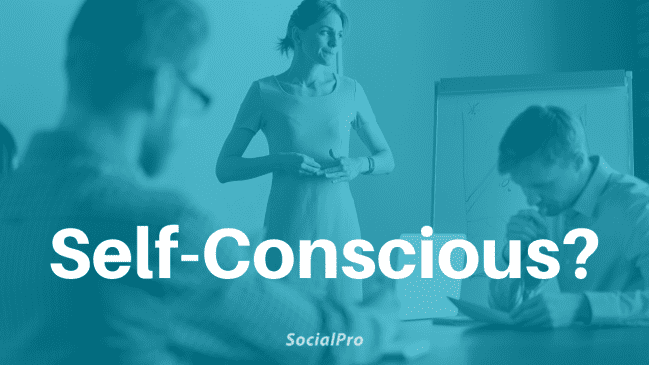





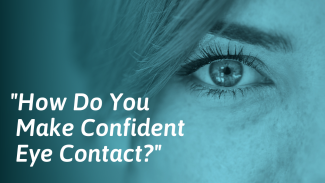

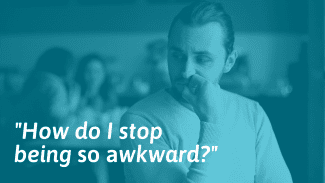

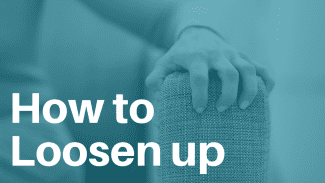
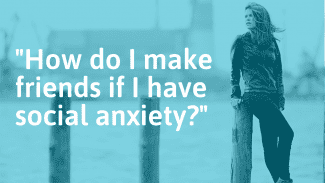
I am afraid of accidentally offending someone and then they will talk bad about me behind my back and think I’m a bad person. I’m afraid of seeming mean or stupid because I get so anxious my mouth just runs and I try to be funny and outgoing and I worry it just comes off as loud and rude. I worry I’m just not likeable and insecurity makes me act dumb. Why do other people seem so at ease with saying what they think?
The most hardest difficulty I have is forming a understandable sentence in my head and then speaking it out clearly so the listener can understand me. I watch people’s faces , either having difficulty or mocking me straight to my face.
So once there was an assessment of communication skills at work. We were given to speak on a random topic for 2 minutes on the spot with one min to prep. Firstly, as it is I was nervous for facing the crowd, with they all staring at me, it freaked me out as I wasn’t sure if my points on the topic were smart enough or not. I somehow started sharing my views when I noticed two people talking to each other, whispering in their ears and smiling/giggling at me. That made me so soo damn anxious that I forgot what I wanted to say and I froze over there , standing on the stage, in front of 50people, stood there speechless for a min. Since then I have tried working on my public facing skills but theres still alot to work on.
If anyone has some suggestions on how I can face a crowd and speak without any prep for two mins or so, please let me know! It’ll be a huge huge help.
Thanks
Hi Heba, I really connected with your story. 1 minute to prepare! I would have been catatonic! I’m so impressed you got up in front of everyone like that. I’m new to this community because I still struggle a lot but I have come up with this that helps me some at work…if I have to present on something I really try to focus on the feeling of sharing with the audience. I think to myself “this is something I know about and am excited about and I want to let them know everything I know” It’s not much but it helps reset my fear to the task at hand. Best of luck and keep working!
I had that experience, when speaking to the crowd do not look at their faces to boost your confidence you can look straight but not their faces,if u have mastered that ,u start looking at few people when making a speech ,before u know it you looking at everyone
Focus on the bigger picture
Hi! Actually I feel very weird talking like this but the thing is that whenever I a, alone with a stranger, I am fine but if I am outside with a group of other people, I start to feel nervous and anxious… I also feel the same around girls. I think people would judge me and they won’t like me… I try to gather the courage and speak about something but I just can’t. That’s why I joined this community.
self-consciousness is a big deal for me. i mean if uve heard the song cradles by suburban he sings about going into his own world and i feel that way witch to me count as self consciousness. still…..i need help. any ideas
also may i add that music helps me inderstand my self consciousness better so if it works for me it might work for others idk really.
Joseph listening to music helps me focus and do my school work it even helps me calm down when i’m having a bad day
What I fear most of the times is being judged for my every move. When I’m out in public I feel like all the eyes are on me and I suddenly forget how to walk. My hands start to sweat and become cold and I feel as if I’m gonna mess up or I’m walking very awkwardly. I feel insecure as if I’m not good enough to talk with as I honestly dont know how to keep a conversation going and I feel like I’m coming off as rude or boring or lame. And as an introvert, I don’t like going to any social gatherings or conversing with other people much, as I feel very left out and stupid. But the thing is I like being alone and in solitude. Don’t get me wrong, I do like my friends and family but I feel more comfortable by myself, at home. But I’m afraid due to this I’m lacking my social skills. I feel that social skills are important and I’d love to develop them and appear more confident and be able to converse with people much confidently and leave a good first impression.
The thing I fear is being mocked and confrontation as I grew up being treated like crap and bullied and bashed alot for just being me so every time I go out I am alert and on guard and I am very aware of myself and I feel like my legs are made of jelly when I walk by someone who reminds me of certain individual from my past. my conversation skills have improved but I do still get nervous and make a fool of myself and my voice sounds like I am afraid or submissive when I am unsure of myself in certain situations , I also feel uncomfortable around other males I think it’s because of the my height as I am only 5’4 and I think because I grew up without a father I am not sure what is expected of me in terms of behaviour and I worry that I come across as weak as I have been alone all my life and have had no friends since childhood so I have no idea of what is considered typical adult male behaviour in terms of making friends or male bonding, I do feel like eyes are on me when I am out in public I also fear judgement as I was homeless for a long time and people would judge me or harass me.
Thank you for being so open about yourself. Through your thoughts and words you show there are kind people out there. You don’t like aggressive communication. Your height is unique. In fact you could be seen as more friendly and less a threat. And being homeless in the past as having developed empthy
I worry about remaining with no friends. Because of my nervousness around people sometimes i cant express myself and i feel that i cannot connect with them.
Hi Zoe i was reading your comment and you said that you feel like you are going to remain friendless well you are not going to remain friendless because i will be your friend feel free to email me at rwhosteter AT outlook.com
I’m afraid of not sounding smart enough. And not having anything to say period. Usually in group conversations I feel I have nothing to contribute, no opinions, no knowledge of the topic, no interest, etc. If I’m directly asked a question my brain scrambles to come up with an answer, but my brain feels really slow and sluggish and I give a broken, pause-filled, less than intelligent answer.
Most of the time I fear being judged from my poor social skills… I tend to break down or fail to speak a full sentence to a group of people just because of my social anxiety, the pressure of everyone’s attention kills me and I end up saying something weird or senseless and sometimes I want to say something in a social group but I end up not saying a thing because I fear I might come across as awkward when I fail to.
I’m afraid of people judging my looks, and my personality. I really try. When someone goes and gives you a number rating your confidence just sinks.
I feel that people judge me for the way I look and that if I don’t look good enough or I’m not so appealing, no-one will want to talk to me. This affects me every time I want to talk to someone because I usually get this overwhelming sense of insecurity. I even get scared to respond to people properly when they come to talk to me. When I was moving to a new school for my final years in high school, two guys approached me and were trying to talk to me. I completely ignored them amd this left a very bad first impression on me. People thought i was a snob and I ended up having less graduating that way.
I worry that I may stutter or mumble or say something wrong, sometimes i worry that I am not good enough or people will judge the way I look. In large groups of people there are those who come across as loud and confident or dismissive of what I have to say.
I feel anxious when I am surrounded by a group of people (more than 3persons) when they start a conversation, in my head i try to integrate with them but then i’m afraid that they will find what i am saying is not interesting or boring so i start overthinking in my head that i lose my concentration till i don’t follow anymore what they’re talking about, so i stay there like a plant not saying any word if no one engage a conversation with me, and also i don’t know how to keep going a conversation with someone most of time it’s short conversations. So by the end, i always finish by blaming myself for not being talkative and social.
I do the exact same thing all the time and it annoys me so much! I’m so glad it’s not just me that does this though, I know exactly how you feel! I think you just have to go for it without even really thinking about it because whatever happens, it’s only a small conversation out of your whole life and you’ll slowly become more confident for it. I’m still working on it myself but I hope this helps 🙂
I feel exactly like this it’s ok once I try to relax but I’ve realised I’ve been like this most of my life and I’ve let it affect me so much so I have missed out on a lot of opportunities. Have you managed to overcome yours?
I get afraid that people won’t like me. Sometimes I also get afraid that I won’t speak loudly enough, that I’ll speak too loud, that my voice is too high/sounds “too innocent,” that I’ll be “too nice,” that people will assume things about me, and that people won’t feel comfortable to be themselves around me. I think people think I’m “too nice” or too much of a “goody too shoes” for them to be completely themselves around me or to invite me to things.
I feel exactly like this, if people think I am being to much of a goody two shoe or if I sound really mean or act awkward.
I struggle. When socializing , i worry as i get stuck finding expressive words or what to say. It scares me. Then it seems to come across as standoffish and a snob.
I am afraid that others may not like me or not want to socialize with me
Yes. So often I am seen as a snob or better than others. Just really dont know what to say so it comes off as judging through silence.
I always get scared when trying to make conversation with someone because I never know what to say to keep a conversation going, and then I feel like people judge me and think I don’t want to speak to them.
I also feel like I don’t fit in sometimes because I don’t enjoy the same things as people around me and then I end up sat there, not engaging with them because I quite frankly don’t want to but then I feel isolated and lonely and don’t know what to do.
I feel the same way sometimes. It’s hard keeping a conversation going when I don’t know much about the topic. I’ve been so busy with school, it feels like it’s the only thing I know how to talk about! Which makes life hard because nobody wants to talk about school all the time.
Im insecure about my voice, I always hate how my voice is so soft compared to other. And I hate the spotlight given when speaking out loud, it always feel like everyone is judging me.
I feel the same way too. People almost always say I need to speak up.
I’m afraid of being rejected by peoples around ;-;
I’m insecure about being seen as a boring lame person. It really makes me anxious whenever I talk to literally anyone so I think a thousand times before talking.
Me too! I’ve been in the same friendship group for years and I think I adopted their views and forgot to think for myself. But recently I became friends with someone new and she stands by her opinions which made me think about my own more. I think you just have to chill and accept your own preferences, without wanting everyone to agree because it doesn’t matter if they don’t. Voice your opinions and be true to yourself. I’m still working on it.
I am afraid when there are three to four strangers standing and I have to talk to them.I am always thinking that what will they think of me if I made a mistake while talking of they will laugh at me because of my voice. I am also afraid of people with good personality my voice doesnt come out of my mouth in front of them.
In truth, I am my own worst enemy (so, mainly my troubles revolve around the distorted thoughts going through my head). These internal thoughts make it harder to converse with others, since it brings lack of confidence and uncertainty to my everyday life – something I could most definitely live without.
Since I’m most to always consumed in my own thoughts, it makes talking to others a puzzle to solve (but not the good kind of puzzle). Personally, I’m one to overthink previous conversations and strive to look like the average, kind, well-to-do person when speaking with others. This consists of a lot of smiling, complimenting, and numerous attempts at helping others. These things might look great on the surface, but underneath all of the honey dipped exterior, an internal battle of insecurities is taking place (and ain’t that the best).
In acknowledging this conflict, it’s made it harder to speak with others without feeling the pressure to be on my best behavior and appear as a kind-hearted individual. The truth is, I don’t want to do good deed for the benefit of looking a certain way or seeming benevolent; I want to do it because it is the right thing to do. And to do that, I need to confront this obstacle; the barrier that comes from within.
Omg this is so relevant and accurate. I’m my worst own enemy too.
Even before I leave the house my mind starts to wonder what I’ve forgotten to do or bring so much so that I usually end up forgetting something important. I worry that someone will notice what I’m thinking so I either pick out neutral matching clothes so I don’t stand out or clean but stained white T and blue jeans that say hey at least I work hard. The drive or walk to work or appointment is filled with the thoughts of being late which I almost never am I’m usually half hour early. Upon arriving my anxiety shoots through the roof. All I can see is the ways I will fail. At least at work once I’ve been there long enough I can start accomplishing something that makes me less nervous. At appointments or social gatherings including family affairs the fear is compounded because the main goal is socializing or otherwise more personal interactions. The thought of having to hide my thoughts when my thoughts are what is required is so fear inducing it cripples me both mentally and physically. Its as if I’m in the middle of a horror film and I’m the next to die.
whenever I’m in a group I’m always afraid to talk coz I feel like what I say would be irrelevant even if i have a valid point and I’m always afraid to approach any new people coz my mind automatically tells me that I’m inferior and somehow unworthy to talk to them
Don’t feel like that ? You can help yourself by facing your fear and move forward , defy yourself, be bold, enjoy the conversation and the time with that people , life is just one and time is limited. Fill up yourself with pride in you and tell yourself why can’t I do like them, I’m as important and have as worth as everyone else. Good luck !!
I think I analyze myself a lot. I think that I am gonna say something wrong now and the most difficult thing for me is to enter into a conversation with two or more people and teachers are my biggest fear
the same thing happens to me all the time and sometimes my mouth just goes numb and i cant talk
I feel inferior I am also afraid of being mocked or disrespected I am ashamed of myself most times because I feel I am not up to standard but most times reflect kick in and I lose control
Same here. Feeling inferior and I am afraid of being disrespected, like somebody laughing or telling me that I speak rubbish.
I’m painfully aware of my A.D.D. going haywire for what feels like every second of the day. I’m always afraid of looking awkward when I move, having a weird expression on my face, coming off as either too extra or too disengaged, being a bad conversationalist, accidentally coming off as inappropriate to the opposite sex, or hurting someone else’s feelings by accident.
The social anxiety makes it all seem so real I can’t even tell if I overthink things or if my worst fears are true.
When I go outside I fill inferior to everyone because of small height, bad face. It makes me nervous and i can’t talk them properly. And with girl my mind become blank, I could not think properly as I always thinking what are the thinking about me.
When I go outside I fill inferior to everyone because of small height, bad face. It makes me nervous and i can’t talk them properly.
in conversations and meetings with new people i worry that they judge me and think of me as boring or akward. I always think that people see me as lonely, or someone to feel bad for. I have never actually been described as lonely to my face, but the thought of being viewed as that makes me so anxoius. I just feel like people see my as an outsider.